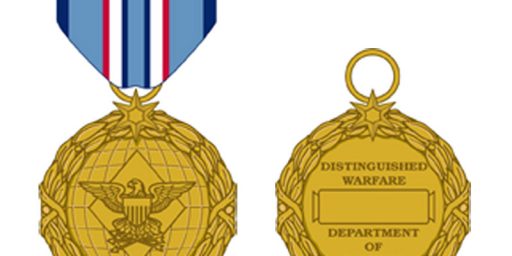Heroes
The Arizona Republic has, presumably coincidentally, two interesting pieces on the nature of heroism in today’s edition. An excerpt from the latest book by John McCain talks about the “inexplicable acts” that lead to the award of the Medal of Honor.
“A kind of madness” is how a friend of mine, a Marine Corps veteran of the Vietnam War, described the courage displayed by men whose battlefield heroics had earned them the Medal of Honor. It’s impossible to comprehend, really, even if you witness it. . . . It’s one mad moment. You never think anyone you know is really capable of it. Not even the toughest, bravest, best men in the company. They’re as surprised as anyone to see it.
And if someone does do it, and lives, they probably never do it again. You might think the guy who’s always running around in a fight, exposing himself to enemy fire, yelling a lot, might do it. But that’s not what happens. They just get killed usually.
Select at random a dozen Medal of Honor recipients and read the citations that accompany their decorations.
Some will describe a single lonely act of heroism, one man’s self-sacrifice that saved the lives of his comrades, who will remember the act for the rest of their lives with feelings of gratitude and lasting obligation mixed with something that feels much like shame – shame that one’s life, no matter how good and useful, no matter how honorable, might not deserve to have been ransomed at such a cost. All the citations will record acts of great heroism, of course. But some might seem plausible, if just barely so. The reader might even fantasize himself capable of such heroism, under extreme circumstances, without feeling too ashamed of the presumption. Maybe you are. At least one, however, will tell of such incredible daring, such epic courage, that no witness to it could imagine himself, or anyone he knows, capable of it.
He goes on to tell of the exploits of MSG Roy Benavidez, who earned the Medal for bravery in Vietnam and then went on to lead a quiet, exemplary life thereafter. McCain doesn’t mention that Benavidez didn’t get the Medal until years after the actions that earned it. Like virtually all such men, he didn’t feel worthy of the honor or the word “hero.”
The editorial page weighs in on Pat Tillman, another man who resisted that label but who most think deserve it.
The Arizona State University star and Arizona Cardinals’ safety turned his back on a lucrative pro contract to join the Army Rangers and go off to war, to Iraq and later Afghanistan, where he lost his life Thursday.
Pat Tillman wasn’t satisfied just taking up space. He had to do more. And that’s why his name and his sacrifice will be remembered long after his football career would have ended.
He made a difference.
But how about the rest of us?
What are we doing?
Why is it that a few hundred thousand Americans risk their lives in what has become a dangerous and dirty war, while the rest of us complain about $2-a-gallon gasoline?
Why should 1,900 Arizona service members, many of them part of the National Guard and Reserves, put their lives and careers on hold, even risk their lives, while the rest of us simply wait for summer vacation?
What can we do?
What can we do to emulate and honor the devotion to duty those men and women display?
We can do a lot. To help them – and others.
The editiorial calls for doing local volunteer service, donating to the Red Cross, and the like. While certainly not on par with volunteering for combat duty–let alone turning down millions to do it–it’s definitely something. And more than most do.
(Hat tip: RealClear Politics)



I’m not complaining about $2 gas, and I’m driving 240 miles round trip twice a week.
The more I know about what’s happening in the rest of the world, the less complaining I do about things here in the US.
—